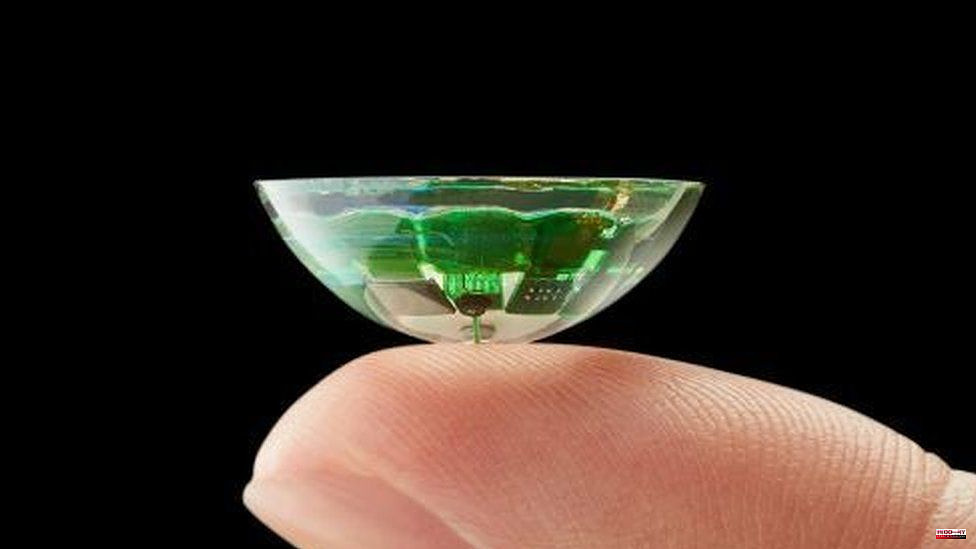Imagine that you are required to give a speech. But instead of looking at your notes, you see the words scrolling in front of you, no matter which direction you look.
This is just one feature that smart contact lenses makers promise will be possible in the future.
Imagine that you are a musician and have your lyrics or chords in front of you. You could also be an athlete with your biometrics, your distance, and any other information you require," Steve Sinclair from Mojo, a company that develops smart contact lenses, says.
His company is currently conducting extensive testing of smart contacts lenses on humans. This will allow the wearer to see a heads-up display that seems to float in front their eyes.
The product's scleral lenses (larger lens that extends to whites of the eyes) corrects the user’s vision. It also includes a microLED display, smart sensors, and solid-state battery.
"We have built what we call an feature-complete prototype that can be worn and works - we're going to soon be testing it internally," states Mr Sinclair.
"Now comes the fun part. We optimize it for power and performance, and we wear it longer to show that it can be worn all day.
Technology for business:
Smart lenses can also be used to collect data about your health.
According to Rebecca Rojas (instructor of optometric science) at Columbia University, lenses could be "able to self-monitor, track intra-ocular pressure or glucose." People with diabetes, for instance, must be vigilant about glucose levels.
They can also offer extended-release drug delivery options which are beneficial for diagnosis and treatment planning. It is exciting to see the progress technology has made and the potential it holds to improve patient lives.
Researchers are working on lenses that can detect and treat eye conditions as well as diabetes and cancer.
For example, the University of Surrey has developed a smart contact lens with a photo-detector to receive optical information, a temperature sensor to diagnose potential corneal diseases, and a glucose sensor to monitor the levels of glucose in the tear fluid.
Yunlong Zhao, University of Surrey lecturer in energy storage, bioelectronics, says, "We make it flat, with a very thin layer of mesh, and can put it directly onto a contact lenses so it's directly touching and has contact with tears solution."
Dr Zhao says that it will be more comfortable to wear, because it is more flexible and can provide more precise sensing results.
Despite all the excitement, smart lenses technology still faces many hurdles.
The challenge is to power them with small batteries. They will have to be tiny enough to deliver enough power to do any useful work.
Mojo is still in testing, but customers should be able to use its lenses throughout the day without needing to recharge.
"The expectation is that you will not consume information constantly from the lens, but only in brief moments throughout the day.
A spokesperson for the company explained that actual battery life depends on how frequently it is used.
Since the launch of Google's smart glasses in 2014 (which was widely regarded as a failure), privacy concerns have been raised.
Daniel Leufer is senior policy analyst at Access Now. He says that any discreet device equipped with a forward-facing camera, which allows the user to take photos or record video, can pose privacy risks to others."
"Smart glasses have some potential to alert others when they are recording, such as red warning lights. However, contact lenses make it more difficult to see how to incorporate such a feature.
Apart from privacy concerns, manufacturers will have to address data security concerns for people who wear the lenses.
Smart lenses cannot fulfill their function if they do not track the user's eye movements. This data, along with other data, could help to uncover a lot.
"What if these devices gather and share data about the things I look on, how long they last, whether my heart rate rises when I look at someone, or how much sweat I produce when I ask a question?" says Mr Leufer.
He adds that this type of intimate data could be used for problematic inferences about anything, from our sexual orientation to whether or not we are telling the truth during interrogation.
"My concern is that devices such as AR (augmented reality), glasses, and smart contact lenses will be seen by some as a potential repository of intimate data."
Mojo, for its part, claims that all data is secure-protected.
There are also concerns that the product may cause irritation to people who have regular contact lenses.
If not taken care of or fitted correctly, any type of contact lens could pose a danger to your eyes.
"Just as with any medical device, we must ensure that patients' health is our priority and that the device used has benefits which outweigh the risks," Ms Rojas from Columbia University says.
I'm concerned about compliance, poor lens hygiene, and over-wear. These could lead to irritation, inflammation, infection, or other complications that can impact your eye health.
Mojo's lenses are expected to be used up to one year at a stretch, so Mr Sinclair acknowledges that this is a concern.
He points out, however, that smart lenses can be programmed to detect if it is being cleaned sufficiently and to notify users when it needs to be replaced.
The firm plans to also work with optometrists in prescription and monitoring.
Sinclair says, "You can't just launch a smart contact lens and expect everyone to adopt it immediately."
It will take time, as with all new consumer products. But we believe it is inevitable that all our eyewear will eventually become smart.












